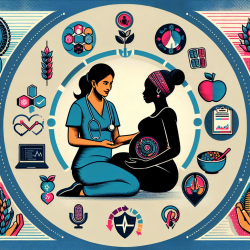As a speech-language pathologist committed to data-driven decisions, I am always on the lookout for research that can enhance our therapeutic practices and outcomes for children. The recent narrative review titled "Narrative Review of the Complex Interaction between Pain and Trauma in Children: A Focus on Biological Memory, Preclinical Data, and Epigenetic Processes" offers a wealth of insights that can help practitioners like us improve our skills and interventions.
Understanding the Complex Interaction between Pain and Trauma
The review underscores the intricate relationship between pain and trauma in children, highlighting the role of biological memory, preclinical data, and epigenetic processes. Here are some key takeaways:
- Biological Memory: Painful and traumatic experiences can alter memory-forming abilities in the developing brain, affecting cognitive functions and emotional regulation.
- Preclinical Data: Animal models provide valuable insights into the molecular and neurological mechanisms underlying pain and trauma, which can inform clinical practices.
- Epigenetic Processes: Early-life stress and trauma can lead to long-lasting epigenetic changes that influence a child's vulnerability to pain and psychological disorders.
Implementing Research Outcomes in Practice
To enhance our therapeutic interventions, we can implement several strategies based on the research findings:
1. Trauma-Informed Care
Understanding the relationship between trauma and pain is crucial for providing effective care. Incorporate trauma-informed approaches to address both emotional and physical pain in children.
2. Early Intervention
Timely intervention during the neurodevelopmental phase can mitigate the long-term effects of trauma and pain. Early identification and treatment are key to improving outcomes.
3. Multidisciplinary Approach
Collaborate with other healthcare professionals to address the multifaceted effects of pain and trauma. A comprehensive approach ensures that all aspects of a child's well-being are considered.
4. Focus on Epigenetics
Understanding the role of epigenetics can help in developing personalized treatment plans. Consider the long-term effects of early-life stress and incorporate strategies that target epigenetic changes.
Encouraging Further Research
While the review provides valuable insights, it also highlights the need for ongoing research. Practitioners are encouraged to stay updated with the latest findings and consider participating in research initiatives to further our understanding of pain and trauma in children.
To read the original research paper, please follow this link: Narrative Review of the Complex Interaction between Pain and Trauma in Children: A Focus on Biological Memory, Preclinical Data, and Epigenetic Processes.










